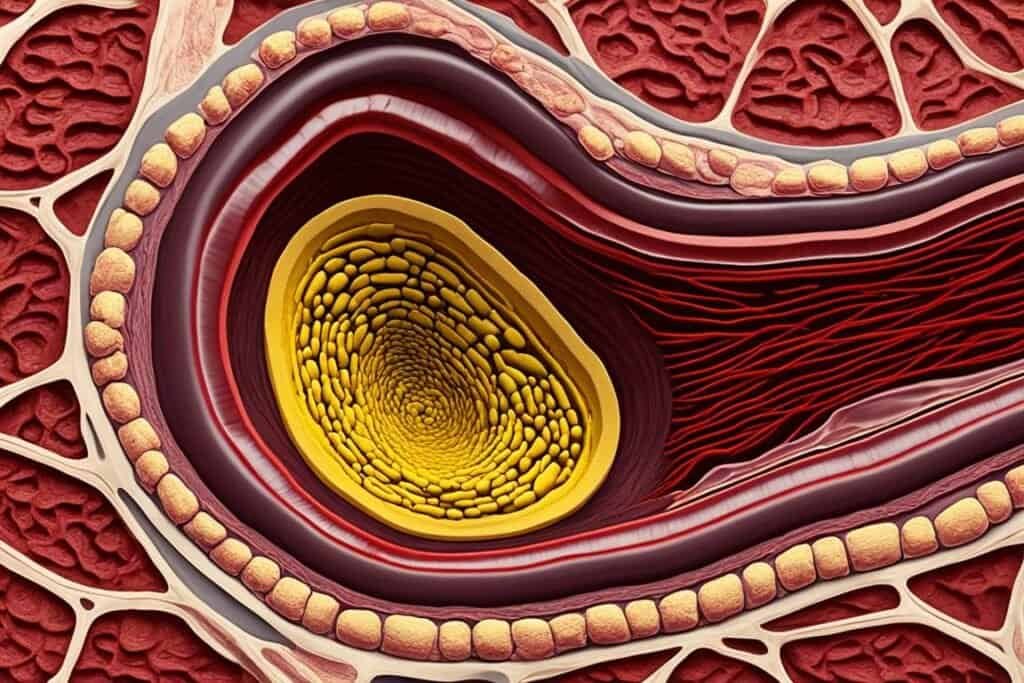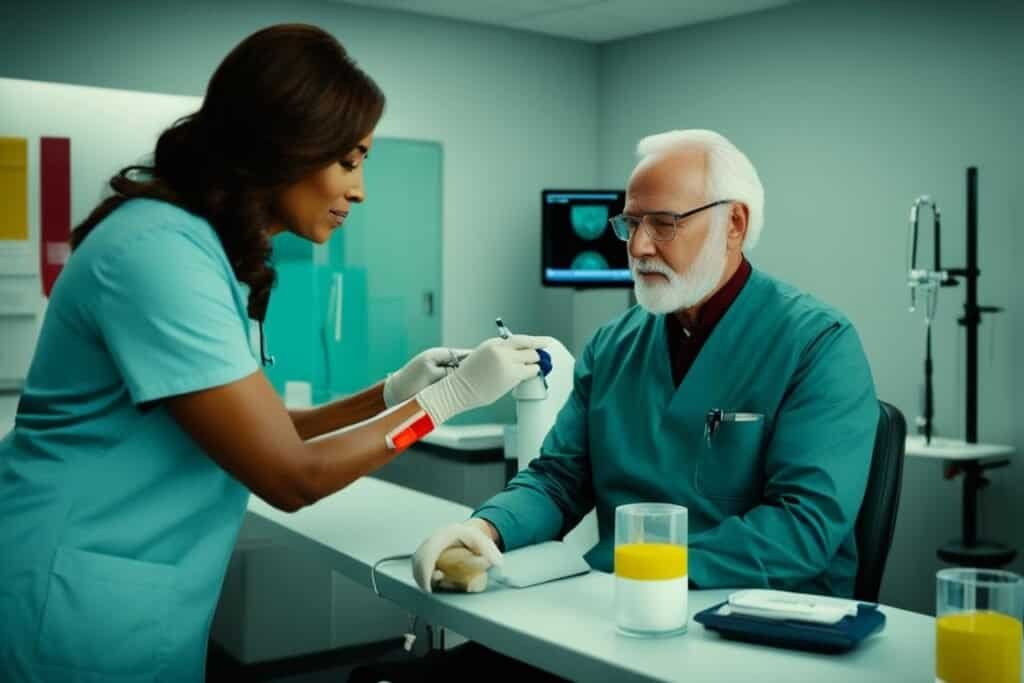Welcome to our article on the importance of cholesterol checks, cholesterol testing, and cholesterol screening. Did you know that high cholesterol levels can silently damage your heart over time, even without any symptoms? That’s why getting your cholesterol checked regularly is crucial for maintaining good cardiovascular health. In this article, we will explore why symptoms don’t always indicate high cholesterol and the significance of regular cholesterol monitoring.
Key Takeaways:
- Cholesterol itself does not cause symptoms but can lead to serious health problems.
- Understanding the impact of cholesterol on your health is essential for proactive screenings.
- High cholesterol typically doesn’t show symptoms until it leads to complications.
- Regular cholesterol monitoring allows for early detection and preventive measures.
- Consult with a healthcare professional for personalized guidance and recommendations.
Understanding Cholesterol and Its Impact on Health
Cholesterol is a crucial component in the body that is produced by the liver. It is a waxy, fat-like substance that plays a vital role in the formation of cell membranes and the production of certain hormones.
There are two types of cholesterol: LDL cholesterol, commonly known as “bad cholesterol,” and HDL cholesterol, known as “good cholesterol.”
High levels of LDL cholesterol can lead to the buildup of plaque in the arteries, a condition known as atherosclerosis. Over time, this plaque can restrict blood flow and increase the risk of heart attack or stroke.
LDL cholesterol: The main carrier of cholesterol in the bloodstream. High levels of LDL cholesterol can contribute to the formation of plaque.
HDL cholesterol: Often referred to as the “good cholesterol” because it helps remove LDL cholesterol from the bloodstream and carries it back to the liver for disposal.
Understanding the role of cholesterol and its impact on health is crucial for proactive health screening and preventive measures. Monitoring and managing cholesterol levels, along with adopting a healthy lifestyle, can help reduce the risk of cardiovascular diseases and promote overall well-being.

Cholesterol Levels and Associated Risks
| Cholesterol Level | LDL Cholesterol | HDL Cholesterol | Risk of Heart Attack or Stroke |
|---|---|---|---|
| Desirable | Less than 100 mg/dL | 60 mg/dL or higher | Low |
| Near/Above Desirable | 100-129 mg/dL | 40-59 mg/dL | Average |
| Borderline High | 130-159 mg/dL | N/A | Average to high |
| High | 160-189 mg/dL | N/A | High |
| Very High | 190 mg/dL or higher | N/A | Very high |
Regular monitoring of cholesterol levels and prioritizing a healthy lifestyle can help maintain optimal cholesterol levels and reduce the risk of plaque buildup, heart attacks, and strokes. It is important to consult your healthcare professional for personalized guidance and to discuss any concerns related to cholesterol.
Why Symptoms Don’t Always Indicate High Cholesterol
High cholesterol is known as a silent killer because it often doesn’t cause any noticeable symptoms until it leads to emergency events such as heart attacks or strokes. It’s important to understand why symptoms may not always be present, and the underlying factors that contribute to this.
When cholesterol levels are high, it can result in the formation of cholesterol plaque in the arteries. Over time, this plaque buildup can narrow the blood vessels and restrict the flow of blood to vital organs, including the heart and brain. However, this process typically happens gradually and doesn’t cause immediate symptoms.
The absence of symptoms doesn’t mean that cholesterol plaque isn’t accumulating. It’s a silent process that can progress quietly until a critical event occurs. That’s why it’s crucial to get your cholesterol levels checked through a blood test. This simple test can provide insights into your cholesterol levels and help identify if you’re at risk.
A blood test measures various types of cholesterol, including LDL (low-density lipoprotein) cholesterol, HDL (high-density lipoprotein) cholesterol, and triglycerides. The results can give healthcare professionals a clearer picture of your cholesterol profile and any potential risks associated with it.
Getting a cholesterol test is recommended for individuals aged 20 and above. After that, periodic testing may be necessary to monitor changes in cholesterol levels. Certain risk factors such as high blood pressure, being overweight, smoking, and genetic conditions can increase the likelihood of high cholesterol. If you have any of these risk factors, more frequent cholesterol checks may be necessary.
Cholesterol Check Frequency Recommendations:
| Risk Factors | Cholesterol Check Frequency |
|---|---|
| No risk factors | Every 5 years |
| One or more risk factors | Every 3-5 years |
| Previous diagnosis of high cholesterol | Yearly |
Remember, your cholesterol levels may not have any symptoms, but they can still pose a significant risk to your health. Regular cholesterol monitoring through blood tests and adhering to recommended check frequencies can help you stay proactive in managing your cardiovascular health.
Importance of Regular Cholesterol Monitoring
Regular cholesterol monitoring is essential for preventive healthcare. Monitoring your cholesterol levels can help detect changes early on and take necessary measures to prevent or manage potential cardiovascular diseases. High cholesterol levels can increase the risk of various conditions, including coronary artery disease, stroke, and peripheral arterial disease.
By regularly monitoring your cholesterol levels, you can make informed decisions about your lifestyle and make the necessary changes to promote good cardiovascular health. Your healthcare provider can guide you in developing a personalized plan to manage your cholesterol levels effectively.
Here are some key reasons why regular cholesterol monitoring is vital:
- Early Detection: Cholesterol monitoring allows for early detection of high cholesterol levels before they lead to serious complications. By identifying the problem early on, you can take proactive steps to address it and prevent further damage to your heart and blood vessels.
- Preventive Measures: Monitoring cholesterol levels empowers you to make positive changes to your lifestyle. By adopting a healthy diet, engaging in regular exercise, and maintaining a healthy weight, you can effectively manage your cholesterol levels and reduce the risk of developing cardiovascular diseases.
- Risk Assessment: Regular cholesterol monitoring helps healthcare providers assess your overall risk for developing cardiovascular diseases. With this information, they can provide personalized recommendations and interventions to reduce your risk and improve your heart health.
- Track Progress: Monitoring cholesterol levels over time allows you to track your progress in managing your cholesterol levels. It helps you determine the effectiveness of your lifestyle changes and any necessary adjustments that may be needed to reach optimal cholesterol levels.
Sample Table: Cholesterol Monitoring Guidelines
| Age Group | Cholesterol Monitoring Frequency |
|---|---|
| 20-39 years | Every 4-6 years, depending on risk factors |
| 40-49 years | Every 4-6 years, or more frequently if at risk |
| 50-59 years | Every 3-5 years, or more frequently if at risk |
| 60+ years | Every 1-2 years, or more frequently if at risk |
Remember, cholesterol monitoring is an essential aspect of preventive healthcare. Consult with your healthcare provider to determine the ideal monitoring frequency based on your age, risk factors, and overall health condition.
Regular cholesterol monitoring, paired with a healthy lifestyle, can significantly reduce the risk of cardiovascular diseases and promote your long-term well-being.

Conclusion
Regular cholesterol checks are essential for maintaining optimal cardiovascular health, even if you do not experience any symptoms. High cholesterol levels can significantly increase the risk of developing serious complications such as heart attacks and strokes. By prioritizing proactive screening and taking preventive measures, such as embracing a healthy lifestyle and seeking timely medical interventions, you can effectively manage your health and minimize the likelihood of cardiovascular diseases.
Remember, getting your cholesterol levels monitored is a crucial step towards taking charge of your well-being. By staying proactive, you can address any cholesterol-related concerns early on, allowing for prompt intervention and management. It is always advisable to consult with a healthcare professional who can provide personalized guidance and recommendations based on your specific needs and circumstances.
Together, let’s prioritize preventive measures and make cholesterol checks a regular part of our healthcare routine. By doing so, we empower ourselves to live healthier, more fulfilling lives, free from the potential risks associated with high cholesterol. Take control of your cardiovascular health today and invest in proactive screening for the well-being of your heart.

